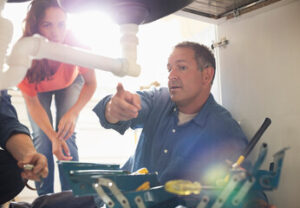A full-service mover does everything for you from packing to transportation. Choosing a reputable mover is important to ensure that your possessions are protected during your move.

Movers should be licensed, insured and bonded to perform local or long distance moves. They should also provide a written estimate. Visit Website to learn more.
Beware of movers that charge inflated prices for packing materials and services. Review the contract carefully to avoid these hidden fees.
Professional movers know how to pack your belongings securely and efficiently. They also use quality packing materials, like cardboard boxes and bubble wrap, to protect your fragile items from damage during transit. You can hire a moving company to pack your entire home or just specific rooms, such as the kitchen and bathroom. In either case, it is best to start packing non-essentials several weeks before your move date. This gives you time to create a schedule and ensures that your moving job is completed on time.
Before you begin packing, take the time to declutter your home and remove items that you no longer need or want. Getting rid of unnecessary items will not only make the packing process easier, but it will also help you save money on your moving costs. You can host a yard sale, sell items online, or donate them to a local charity.
Begin the packing process by sorting through your belongings, room by room. This will allow you to get an idea of how many boxes you will need and will also help you figure out what can be packed together. Using the purging process as an opportunity to clear out your clutter will not only save you money on moving expenses, but it will also give your new home a cleaner look when you are ready to move in.
As you begin to pack, be sure to use plenty of packing materials, like bubble wrap and paper towels, to protect your possessions. Also, remember to pack heaviest items first and lighter items last. This will prevent items from shifting during transit and will make unpacking easier once you arrive at your new residence.
Label each box with its contents and the room it should go to in your new home. This will not only help you stay organized, but it will also ensure that your movers know where each box should be placed when it arrives at the destination room. It is also a good idea to include any special handling instructions, such as “Fragile” or “This Side Up.”
If you have large pieces of furniture that need to be disassembled, mark them with a colored dot or a sticker with your family’s name on it so that the movers know to take extra care when moving these items. You can also mark a “parts box” to hold small components like casters and remotes, so that they don’t get lost during the packing and unpacking process.
Using a color coded system to mark which room each box belongs in will also help you and your movers stay organized. For example, boxes marked with a blue dot will go into the kitchen, while boxes marked in red will go into the bedroom. This will help you avoid wasting any boxes and will ensure that your most important belongings are properly placed in the right rooms at the end of the packing process. This will minimize the amount of upheaval that occurs during the move, and will help you settle in quickly at your new home.
Loading
Streamlining the loading process is an essential aspect of efficient moving services. The process involves determining the right combination of packing supplies and implementing efficient strategies for loading the truck with your belongings. It also requires assessing spatial constraints within your new location, such as narrow hallways and tight corners. Recognizing these challenges early on allows movers to develop strategies for maneuvering them quickly and safely.
Loading your items in the most effective way possible is essential for ensuring that your belongings arrive at their new home in pristine condition. The process starts with drafting a plan for how your furniture and boxes will be arranged inside the truck. This will save time and energy during the load-in process, and ensure that your belongings are loaded in an order that maximizes space utilization. For example, if your bedroom furniture is too large to fit in one piece, you may want to consider separating it into two pieces and loading them separately. This will minimize the risk of damage and ensure that your belongings are positioned in a way that is easy to unload at your destination.
The process of loading your belongings in the truck also requires utilizing proper lifting techniques to avoid straining your back and body. Professional movers are trained in ergonomic lifting techniques that minimize the risk of musculoskeletal injuries during the move. They are also skilled in creating a balanced and stable load that minimizes shifting during transit. This is accomplished by arranging boxes on multiple tiers, with the heaviest items at the bottom and lighter objects on top. They also use fillers, such as smaller boxes or plush blankets, to fill in any empty spaces between stacked items.
Using hand trucks and dollies is another effective tool for speeding up the loading process. These tools enable movers to transport several boxes at once, which cuts down on the number of trips they have to make to and from the truck. They can even carry heavy furniture through stairwells, which would be impossible with a regular moving cart.
The timing of your move is another important factor in determining the loading timeline. Peak moving seasons, such as summer, can lead to congested schedules and longer waiting times, which can impact the efficiency of your moving service.
Incorporating premove preparation into your moving strategy is another effective strategy for minimizing loading times. By clearly labeling your boxes and preparing an inventory list, you can streamline the loading process. This will allow your movers to focus on the logistics of the process rather than coordinating with disorganized belongings. It’s also helpful to prepack your boxes before the move, which will eliminate last-minute scrambles and reduce the chances of mistakes. If you choose to pack your own boxes, be sure to utilize a sturdy container and follow proper box-stacking techniques. You should also pack heavier items at the bottom of your boxes to prevent them from crushing lighter ones or spilling their contents. Lastly, don’t forget to secure and wrap any rugs you plan to load into the truck with mover’s tape or stretch wrap.



